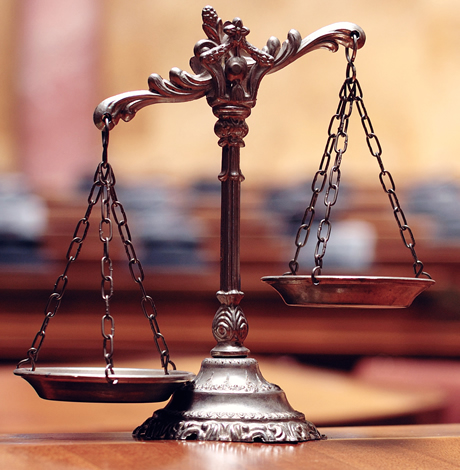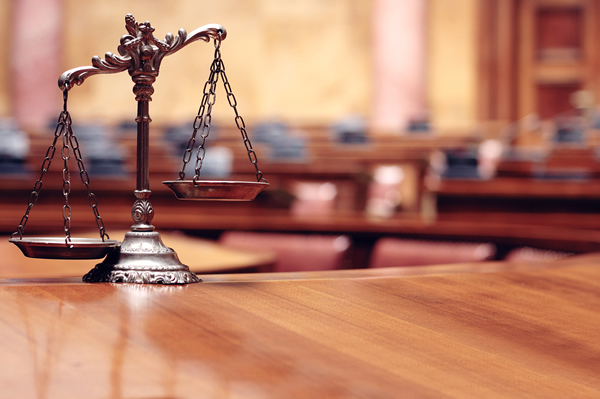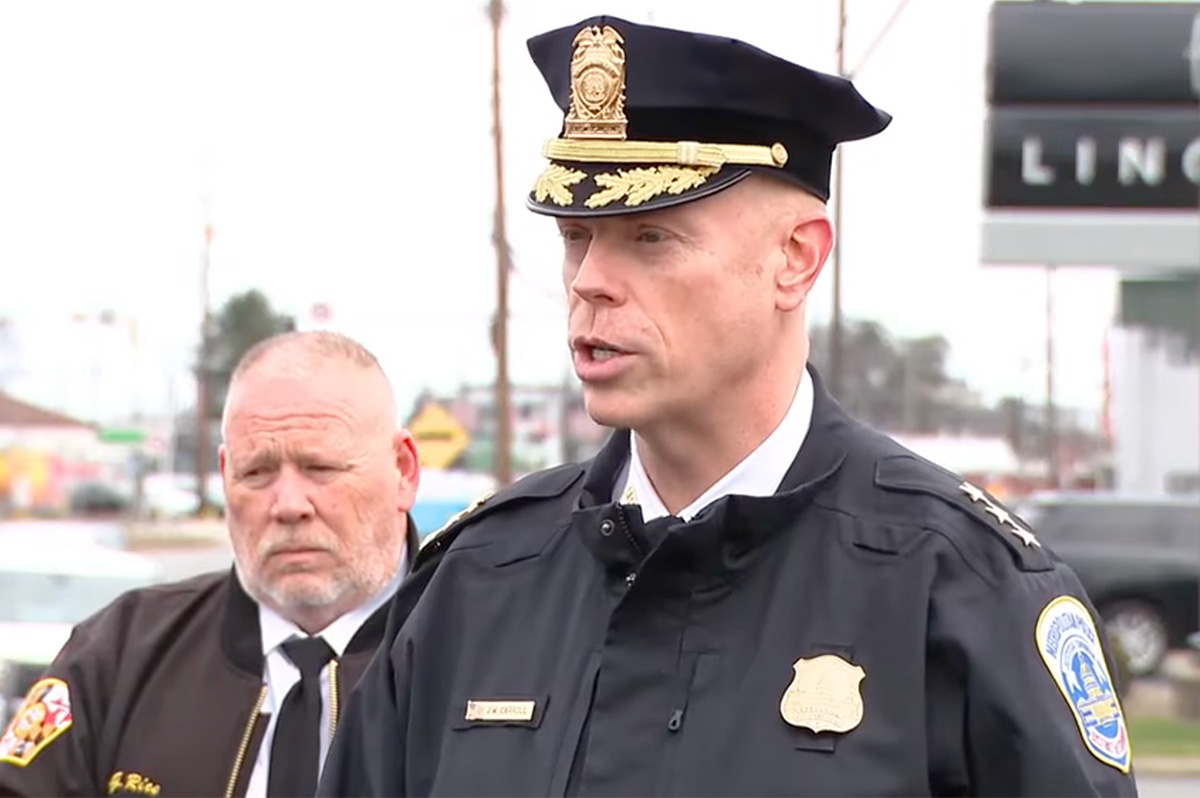Local
D.C. double murder doesn’t appear to be hate crime
Prosecutors say dispute over money triggered shooting deaths


Prosecutors say dispute over money triggered shooting deaths.
A D.C. police homicide detective testified at a Superior Court hearing on Tuesday that an argument over money appears to be what prompted defendant David Bright, 29, to allegedly shoot two gay men to death on Feb. 18 inside a group house at 509 58th St., N.E. where the three lived.
Det. Marvin Washington testified that an eyewitness to the incident who also lived in the house told police that Bright shot Clifton David Francis, 51, and David Aumon Watkins Jr., 45, multiple times while in a rage and acting as if he were “crazy.”
Police and prosecutors have not publicly identified the two victims as gay. But law enforcement sources familiar with the case have told the Washington Blade the two were gay and that Sgt. Jessica Hawkins, supervisor of the department’s LGBT Liaison Unit, and Officer Zunnobia Hakir, a member of the LGBT unit, were called to the scene on the day of the murders.
“This case remains under investigation,” said William Miller, a spokesperson for the U.S. Attorney’s office, which is prosecuting the case. “However, based on the charging documents and court testimony, you can state that there are no allegations that this is a hate crime,” said Miller, who noted that the incident “is believed to involve a dispute over money.”
At the time of his arrest, police charged Bright with first-degree murder while armed.
At the preliminary hearing on Tuesday, Det. Washington appeared to confirm that at least one of the two victims was gay. In response to a question by defense attorney Dominique Winters, he said that the eyewitness to the murders had been in a “romantic relationship” with one of the two victims.
Washington answered the question after Judge Jose Lopez overruled an objection by Assistant U.S. Attorney Magdalena Acevedo, the lead prosecutor in the case, who said the line of questioning was not germane to the case.
Although Washington was careful not to disclose the witness’s gender, referring to the person as Witness 1 or “it,” both Winters and Lopez at various times referred to the witness as “he” or “him.” A law enforcement source also confirmed that Witness 1 is a man.
In her arguments urging Lopez to rule that there was insufficient evidence to find probable cause that the case should proceed to a full trial, Winters suggested that Witness 1 was “biased” against her client and biased toward the decedents because of his romantic relationship with one of the decedents.
Prosecutor Acevedo took strong exception to the argument that Witness 1 was biased. She pointed to Washington’s testimony that Witness 1 provided police with a detailed account of how he saw Bright point his handgun and shoot Francis in the living room of the house.
A police arrest affidavit says Witness 1 told police that while shooting Francis, Bright yelled, “This will teach you.” The affidavit says Witness 1 told police he heard the other victim, who was later identified as David Watkins, yelling, “Day-Day, what are you doing? You’re crazy.”
The witness and others who know Bright said Bright went by the nickname Day-Day.
According to the arrest affidavit, Witness 1 recounted that he then heard several more gunshots that he assumed were fired at Watkins.
Police have said Francis, who suffered multiple gunshot wounds to the body and head, was pronounced dead at the scene. Watkins, who suffered from at least one gunshot wound to the body, was taken to Prince George’s Hospital, where he later died, the affidavit says.
Washington also testified that police found 22 shell casings at the house where the incident occurred and later matched them to a handgun that they recovered from Bright at the time of his arrest.
In addition, in response to questioning by Acevedo, Washington testified that another witness who has family ties with Bright told police that Bright telephoned the witness, listed as Witness 2, and confessed to having shot and killed two men at the 58th Street address.
Based on this and other information provided by police, Lopez ruled that probable cause exists that Bright committed the murders and the case should advance to trial. He denied a request by Winters that Bright be released to a halfway house, saying evidence presented by police and prosecutors indicates that Bright would be a danger to the community. He then scheduled a felony status hearing for June 10.
Prior to Washington’s testimony, Acevedo and Winters told Lopez that Bright had rejected a plea bargain offer from prosecutors. The two did not provide details of the offer, but Acevedo said it involved requiring that Bright accept a sentence of at least 20 years in jail.
At the start of the April 5 hearing, Bright was escorted into the courtroom with what appeared to be white bandages placed over the top of his head. Neither his attorney nor prosecutor Acevedo disclosed what happened to cause the apparent injury.
Shortly after entering the courtroom at the start of the hearing guards escorted Bright out of the courtroom before he returned about five minutes later. Minutes after that he began shouting, “People are trying to kill me. People don’t know what happened.”
Guards responded by hastily escorting Bright back out of the courtroom. About 10 minutes later, after the proceeding was put on hold, Bright was escorted back into the courtroom.
“I apologize, your honor,” Bright said. “That’s OK,” Judge Lopez responded.
District of Columbia
Kennedy Center renaming triggers backlash
Artists who cancel shows threatened; calls for funding boycott grow

Efforts to rename the Kennedy Center to add President Trump’s name to the D.C. arts institution continue to spark backlash.
A new petition from Qommittee , a national network of drag artists and allies led by survivors of hate crimes, calls on Kennedy Center donors to suspend funding to the center until “artistic independence is restored, and to redirect support to banned or censored artists.”
“While Trump won’t back down, the donors who contribute nearly $100 million annually to the Kennedy Center can afford to take a stand,” the petition reads. “Money talks. When donors fund censorship, they don’t just harm one institution – they tell marginalized communities their stories don’t deserve to be told.”
The petition can be found here.
Meanwhile, a decision by several prominent musicians and jazz performers to cancel their shows at the recently renamed Trump-Kennedy Center in D.C. planned for Christmas Eve and New Year’s Eve has drawn the ire of the Center’s president, Richard Grenell.
Grenell, a gay supporter of President Donald Trump who served as U.S. ambassador to Germany during Trump’s first term as president, was named Kennedy Center president last year by its board of directors that had been appointed by Trump.
Last month the board voted to change the official name of the center from the John F. Kennedy Memorial Center For The Performing Arts to the Donald J. Trump And The John F. Kennedy Memorial Center For The Performing Arts. The revised name has been installed on the outside wall of the center’s building but is not official because any name change would require congressional action.
According to a report by the New York Times, Grenell informed jazz musician Chuck Redd, who cancelled a 2025 Christmas Eve concert that he has hosted at the Kennedy Center for nearly 20 years in response to the name change, that Grenell planned to arrange for the center to file a lawsuit against him for the cancellation.
“Your decision to withdraw at the last moment — explicitly in response to the Center’s recent renaming, which honors President Trump’s extraordinary efforts to save this national treasure — is classic intolerance and very costly to a non-profit arts institution,” the Times quoted Grenell as saying in a letter to Redd.
“This is your official notice that we will seek $1 million in damages from you for this political stunt,” the Times quoted Grenell’s letter as saying.
A spokesperson for the Trump-Kennedy Center did not immediately respond to an inquiry from the Washington Blade asking if the center still planned to file that lawsuit and whether it planned to file suits against some of the other musicians who recently cancelled their performances following the name change.
In a follow-up story published on Dec. 29, the New York Times reported that a prominent jazz ensemble and a New York dance company had canceled performances scheduled to take place on New Year’s Eve at the Kennedy Center.
The Times reported the jazz ensemble called The Cookers did not give a reason for the cancellation in a statement it released, but its drummer, Billy Hart, told the Times the center’s name change “evidently” played a role in the decision to cancel the performance.
Grenell released a statement on Dec. 29 calling these and other performers who cancelled their shows “far left political activists” who he said had been booked by the Kennedy Center’s previous leadership.
“Boycotting the arts to show you support the arts is a form of derangement syndrome,” the Times quoted him as saying in his statement.
District of Columbia
New interim D.C. police chief played lead role in security for WorldPride
Capital Pride says Jeffery Carroll had ‘good working relationship’ with organizers

Jeffery Carroll, who was named by D.C. Mayor Muriel Bowser on Dec. 17 as the city’s Interim Chief of Police, played a lead role in working with local LGBTQ community leaders in addressing public safety issues related to WorldPride 2025, which took place in D.C. last May and June
“We had a good working relationship with him, and he did his job in relation to how best the events would go around safety and security,” said Ryan Bos, executive director of Capital Pride Alliance.
Bos said Carroll has met with Capital Pride officials in past years to address security issues related to the city’s annual Capital Pride parade and festival and has been supportive of those events.
At the time Bowser named him Interim Chief, Carroll had been serving since 2023 as Executive Assistant Chief of Specialized Operations, overseeing the day-to-day operation of four of the department’s bureaus. He first joined the D.C. Metropolitan Police Department in 2002 and advanced to multiple leadership positions across various divisions and bureaus, according to a statement released by the mayor’s office.
“I know Chief Carroll is the right person to build on the momentum of the past two years so that we can continue driving down crime across the city,” Bowser said in a statement released on the day she announced his appointment as Interim Chief.
“He has led through some of our city’s most significant public safety challenges of the past decade, he is familiar with D.C. residents and well respected and trusted by members of the Metropolitan Police Department as well as our federal and regional public safety partners,” Bowser said.
“We have the best police department in the nation, and I am confident that Chief Carroll will meet this moment for the department and the city,” Bowser added.
But Bowser has so far declined to say if she plans to nominate Carroll to become the permanent police chief, which requires the approval of the D.C. City Council. Bowser, who announced she is not running for re-election, will remain in office as mayor until January 2027.
Carroll is replacing outgoing Chief Pamela Smith, who announced she was resigning after two years of service as chief to spend more time with her family. She has been credited with overseeing the department at a time when violent crime and homicides declined to an eight-year low.
She has also expressed support for the LGBTQ community and joined LGBTQ officers in marching in the WorldPride parade last year.
But Smith has also come under criticism by members of Congress, who have accused the department of manipulating crime data allegedly showing lower reported crime numbers than actually occurred. The allegations came from the Republican-controlled U.S. House Oversight Committee and the U.S. Justice Department
Bowser has questioned the accuracy of the allegations and said she has asked the city’s Inspector General to look into the allegations.
Meanwhile, a spokesperson for the D.C. police Office of Public Affairs did not immediately respond to a question from the Washington Blade about the status of the department’s LGBT Liaison Unit. Sources familiar with the department have said a decline in the number of officers currently working at the department, said to be at a 50-year low, has resulted in a decline in the number of officers assigned to all of the liaison units, including the LGBT unit.
Among other things, the LGBT Liaison Unit has played a role in helping to investigate hate crimes targeting the LGBTQ community. As of early Wednesday an MPD spokesperson did not respond to a question by the Blade asking how many officers are currently assigned to the LGBT Liaison Unit.
Arts & Entertainment
2026 Most Eligible LGBTQ Singles nominations
We are looking for the most eligible LGBTQ singles in the Washington, D.C. region.

Are you or a friend looking to find a little love in 2026? We are looking for the most eligible LGBTQ singles in the Washington, D.C. region. Nominate you or your friends until January 23rd using the form below or by clicking HERE.
Our most eligible singles will be announced online in February. View our 2025 singles HERE.
-

 Photos4 days ago
Photos4 days agoThe year in photos
-

 Sponsored3 days ago
Sponsored3 days agoSafer Ways to Pay for Online Performances and Queer Events
-

 District of Columbia2 days ago
District of Columbia2 days agoTwo pioneering gay journalists to speak at Thursday event
-

 a&e features2 days ago
a&e features2 days agoQueer highlights of the 2026 Critics Choice Awards: Aunt Gladys, that ‘Heated Rivalry’ shoutout and more


















